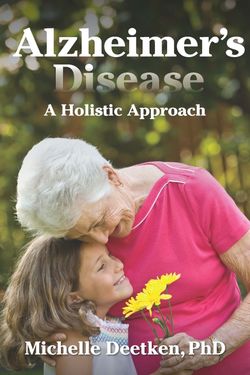Читать книгу Alzheimer's Disease - Michelle Deetken - Страница 7
На сайте Литреса книга снята с продажи.
ОглавлениеMy Grandfather's Story
“It's like a maze in here,” he grumbled to himself as he wandered around the huge and dreary hospital. He knew Betty must be somewhere in one of the rooms. Why else would he be here since he was not the one wearing the hospital gown! He kept looking into every room, but he did not recognize a soul.
He knew his memory was going, but he thought, “Hell, I know what my wife looks like!” Did he somehow wind up on the wrong floor? “Darn memory,” he thought, now starting to panic just a little. Next room, still no Betty. “Maybe I am here for my grandson,” he theorized, “I did pass by some rooms with children in them.”
He stops a nurse and asks her if he is on the children's floor. She told him that the children's ward was in another wing and ran off in a hurry. He became extremely panicked, thinking, “Why am I here?” His memory had failed him because now he was truly lost. He looked into the next few rooms hoping to find a nurse or a doctor to help him. His panic kept growing, and he was starting to feel a tightening in his chest.
In her hospital bed, Betty was wondering where Julian was. Knowing that his memory was not as sharp as it had been even six months earlier, she started to worry. She asked her doctor to look for him since he might be lost. Before her heart surgery, she could still take care of him in their home, but now she worried if she would be too weak. To make things worse, Julian had started to depend on her more and more, even for minor things.
Her doctor was at the nurse's station to ask the nurses if anyone had seen Julian just as he was struggling down the hall.
“Mr. Fairless, Betty is in room 504,” the doctor said as he grasped Julian's hand and led him a couple of rooms down the hall. When Julian saw his wife, he was shaking and instantly ran over and hugged her! But his panic had overtaken his body, and he died instantly in her arms of a massive heart attack.
He was fortunate. His Alzheimer's disease had only become noticeable several years earlier. In hindsight, the signs of the disease had been observed by family members about six years before his death.
Why do I think my grandfather was fortunate? I watched my Grandmother Sylvia's downward progression with the disease over a fifteen-year period of time. For the last five years of her life, my grandmother, as we knew her, was gone. Those last five years were excruciating for my family, especially for my uncles who were her caregivers. She had anger issues, could not recognize anyone, and experienced hallucinations. Those were only some of the problems she exhibited. The five years before that time were heartbreaking as the disease slowly took over her mind; sometimes she was herself, but other times she would become confused and angry. She would often wake up in the middle of the night, and either she did not know where she was, or she could not find something and would frantically search for that missing item.
The first five years of her Alzheimer's disease were truly frustrating, as she wanted to keep her independence. She loved living alone and having the freedom to use her car, but she was gradually becoming a hazard to herself and others. One night, her neighbors found her running down the street frantically calling for her mother who had died almost thirty years before. Grandmother Sylvia routinely called 911 because she thought that people were either breaking into her home or that people were there who refused to leave. Invariably, when the police arrived there was no one to be found. After about five of these emergency calls, the police advised my uncles that she needed to be placed into someone's care because they could no longer respond to her calls. My uncles chose to take her into their home where they experienced her downward decline firsthand. Those of you with family members who have this disease are familiar with the heartrending progression of Alzheimer's disease.
My family is very worried about getting Alzheimer's disease—especially my mother and her brother, since both of their parents had the disease—and many Americans are worried as well. An Alzheimer's survey taken in 2010 for the MetLife Foundation revealed that Americans fear getting Alzheimer's disease almost as much as cancer, which is currently the most feared disease. More than half of those surveyed knew little or nothing about the disease. Since AD is predicted to mushroom with the advent of the aging baby boomers, knowledge of the disease, as well as tools to reduce the risk, will be beneficial for all of us.
